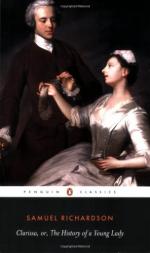What miscreants are we! What figures shall we make in these terrible hours!
If Miss Harlowe’s glorious example, on one hand, and the terrors of this poor man’s last scene on the other, affect me not, I must be abandoned to perdition; as I fear thou wilt be, if thou benefittest not thyself from both.
Among the consolatory things I urged, when I was called up the last time on Sunday night, I told him, that he must not absolutely give himself up to despair: that many of the apprehensions he was under, were such as the best men must have, on the dreadful uncertainty of what was to succeed to this life. ’Tis well observed, said I, by a poetical divine, who was an excellent christian,* That
Death
could not a more sad retinue find,
Sickness and pain
before, and darkness all behind.
* The Rev Mr. Norris, of Bremerton.
About eight o’clock yesterday (Monday) morning, I found him a little calmer. He asked me who was the author of the two lines I had repeated to him; and made me speak them over again. A sad retinue, indeed! said the poor man. And then expressing his hopelessness of life, and his terrors at the thoughts of dying; and drawing from thence terrible conclusions with regard to his future state; There is, said I, such a natural aversion to death in human nature, that you are not to imagine, that you, my dear Belton, are singular in the fear of it, and in the apprehensions that fill the thoughtful mind upon its approach; but you ought, as much as possible, to separate those natural fears which all men must have on so solemn an occasion, from those particular ones which your justly-apprehended unfitness fills you with. Mr. Pomfret, in his Prospect of Death, which I dipped into last night from a collection in your closet, which I put into my pocket, says, [and I turned to the place]
Merely to die, no man of reason
fears;
For certainly we must,
As we are born, return to dust;
’Tis the last point of many ling-ring
years;
But whither then we go,
Whither, we fain would know;
But human understanding cannot show.
This makes us tremble——
Mr. Pomfret, therefore, proceeded I, had such apprehensions of this dark state as you have: and the excellent divine I hinted at last night, who had very little else but human frailties to reproach himself with, and whose miscellanies fell into my hands among my uncle’s books in my attendance upon him in his last hours, says,
It must be done, my soul:
but ’tis a strange,
A dismal, and mysterious change,
When thou shalt leave this tenement of clay,
And to an unknown—somewhere—wing
away;
When time shall be eternity, and thou
Shalt be—thou know’st not
what—and live—
thou know’st not how!
Amazing state! no wonder that we dread
To think of death, or view the dead;
Thou’rt all wrapt up in clouds, as if
to thee
Our very knowledge had antipathy.




